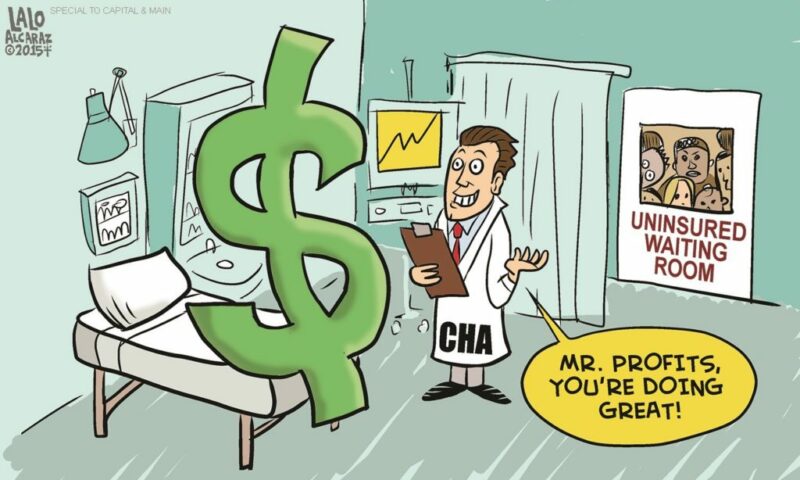
By now, you have probably heard about the riot at the for-profit Kingman Prison in Arizona. Days of unrest at the prison, run by the privately-held Management Training Corporation, left 15 wounded and forced nearly 1,000 incarcerated people to be transferred to other facilities. The same facility also suffered from a major riot in 2010. Similarly, people detained at an MTC-run camp in Texas names Willacy rioted earlier this year, forcing that facility to close completely.
The Kingman riots are focusing renewed attention on the Arizona legislature’s long, cozy relationship with the private prison industry. The repeated failings of for-profit prison operators have led Arizonans and the editorial board for the state’s largest paper to ask some big questions:
» Read more about: Questions Surround Private Prisons After AZ Riot »


Hopes were high among environmentalists when a bill designed to protect California’s drinking water was introduced in the state Assembly earlier this year. After all, California has passed some of the most far-reaching environmental laws and regulations in the nation, and the state legislature is dominated by the Democratic Party, whose members are generally inclined to vote for tougher environmental standards. Moreover, California is in the midst of a massive drought, which gave the bill more urgency. And besides, clean water isn’t a threatened desert flower or endangered minnow – it’s something everyone depends on for existence.
It never had a chance.
The measure, Assembly Bill 356 (Das Williams, D-Carpinteria), was intended to protect underground sources of drinking water from oil and gas wastewater disposal and enhanced oil recovery treatments, and called for monitoring near certain injection wells. That immediately put it in the crosshairs of the most powerful oil interests in California,
» Read more about: How Democrats Mixed Oil and Water, Killing Environmental Bill »


Los Angeles County Supervisor Mike Antonovich has hired a corporate-sponsored lobby group and PR firm to conduct a so-called “study” of the minimum wage.
Under Antonovich’s orders, the County is going to pay $55,000 to the Washington, D.C.-based Employment Policies Institute (EPI) to help him undermine a plan to create a countywide minimum wage that would reach $15 an hour by 2020, similar to the one recently passed by the City of Los Angeles. The policy would cover about a million employees in the unincorporated areas of the nation’s largest county.
Any one of the supervisors can authorize the county’s CEO to commission an analysis of a policy being considered without a vote from the other four members. That’s what Antonovich — who chairs the board meetings and prefers to be called the county’s “mayor” — did at the end of June.
Antonovich asked EPI to do extensive research on for-profit and nonprofit employers in the county’s unincorporated areas –
» Read more about: Meet Mike Antonovich's Minimum Wage Hitman »
Since the invention of the movie camera in the late 19th century, filmmaking has seen only a smattering of seminal technical developments. Only the advent of sound and color spawned sea changes in the medium. But in this century, the digital revolution has made it exponentially easier for filmmakers to tell stories. It was only a matter of time, then, before people started filming features using arguably the most ubiquitous technological device of our time.
It would be easy to prematurely dismiss Tangerine as a gimmick. After all, with all the tools of the trade available to film a movie, picking a 4.87-by-2.3-inch iPhone 5s seems not only ambitious but possibly a filmmaker’s folly. Luckily, for writer-director Sean Baker, the phone is a smart choice indeed.
‘Tangerine’ is ‘After Hours’ in heels, made on a dime.
It is the afternoon of Christmas Eve.


If it becomes law, a reform bill now in the state legislature will mark a milestone in the two-year effort to rein in the secretive but powerful private organization responsible for accrediting California’s 112 public community colleges. The target of Assembly Bill 1397 is the Accrediting Commission for Community and Junior Colleges (ACCJC), which was recently thwarted from terminating the accreditation of the City College of San Francisco (CCSF), mostly for issues stemming from the academically high-rated school’s Great Recession-battered finances.
The political firestorm sparked by the unelected commission’s effort to effectively close CCSF turned a spotlight of publicity on the darker policy corners of the commission, revealing an almost comically rogue culture of nepotism, free-market radicalism and mandarin indifference to the lives of students and teachers. But now the commission finds itself caught in that light once more,
» Read more about: Teaching Moment: Will Sacramento School College Accreditors? »


 Every year, every quarter, every month, the conventional economists either praise the increase in Gross Domestic Product (GDP) or anxiously wring their hands because the economy has not expanded enough. Expansion requires two key elements: a constant search for the lowest possible wages and an unending supply of raw materials – particularly fossil fuels, but also fertile soil and fresh water, and sometimes, creatures who live on the earth and in the seas.
Every year, every quarter, every month, the conventional economists either praise the increase in Gross Domestic Product (GDP) or anxiously wring their hands because the economy has not expanded enough. Expansion requires two key elements: a constant search for the lowest possible wages and an unending supply of raw materials – particularly fossil fuels, but also fertile soil and fresh water, and sometimes, creatures who live on the earth and in the seas.
While there are still places on the planet where people will take any job they can get, the ability to extract more energy resources gets riskier, and the environment’s capacity to absorb more waste is fast approaching zero. Reaching the outer limits of expansion threatens all of life on the planet. That reality is why many people are now calling for an “ecological civilization” as an alternative to more exploitation and extraction, one that offers another pathway for human civilization to take.


The nurses who showed up at state Senator Richard Pan’s Capitol office in May were furious. They had been assured by Pan, a Democrat from Sacramento, that he would be on their side when it came time to vote on Senate Bill 346, a charity care measure aimed at providing transparency to the state’s currently murky rules governing tax-exempt status for nonprofit hospitals.
But Pan, a physician who has risen to prominence this year as the sponsor of a mandatory school vaccination bill, abstained when the bill came up for a vote in the Senate’s health committee, effectively killing it when it fell one vote short of passing in that committee on April 29. The nurses alleged that the bill died because Pan withdrew his promised support after heavy, last-minute lobbying by the California Hospital Association (CHA). Pan’s spokesperson, Shannan Martinez, later issued a denial,
» Read more about: The Persuaders: California Hospital Association »


Here’s something you probably didn’t know happened in California in the last few years, and maybe it’s something you never imagined could happen: In 2011, two high-ranking state regulators were fired from their posts for pissing off the oil industry. No one really disputes the veracity of that statement; not even Governor Jerry Brown. “They were blocking oil exploration in Kern County,” the Sacramento Bee reported Brown announcing at an event six months later. “I fired them, and oil permits for drilling went up 18 percent.”
Catherine Reheis-Boyd, president of the Western States Petroleum Association, also celebrated without restraint, unconcerned that the people of California might detect her hand guiding the Governor’s pink-slip pen. After the firings, Reheis-Boyd boasted to the Los Angeles Times that her industry once again had a “clear pathway for people to get permits and proceed with drilling in this state.
» Read more about: The Persuaders: Western States Petroleum Association »


“Something always seems to be starting in California,” Angelo Amador, an attorney and vice president for the National Restaurant Association, told Bloomberg News.
It was 2012 and his remark was prompted by a California state Supreme Court decision favoring an employee’s right to have defined meal-break times. The association—dubbed “the other NRA” for its lobbying muscle, with annual revenues of $71 million in 2013–had vigorously opposed policy that required employers to ensure that workers take rest and meal breaks rather than leaving it to the employees to push back against managers to enforce break provisions.
Amador’s NRA is perhaps the largest trade group that you have never heard of, and supports an “institute” run by a PR firm that churns out opinions and papers to shape policy debates.
Also read these stories in our “Persuaders”
» Read more about: The Persuaders: California Restaurant Association »


Ever wonder how a bill doesn’t become a law?
One week we’ll be hearing all about a proposed law intended to improve the quality of life for the majority of Californians, a bill that seemingly has on board every state Senator or Assembly member who cares about the environment, consumer rights or worker safety. Then, suddenly – Poof! – the next thing we know, the legislation has been killed in committee or withdrawn by its sponsor.
Whenever we hear of these kinds of Sacramento stories, we might assume it’s the work of the Chamber of Commerce. After all, the CalChamber is the state’s big guard dog defending corporate interests by placing long-overdue bills on its dreaded Job Killer list. But the Chamber isn’t the only bully on the block – it often has help from a gang of powerful lobbying organizations that represent the individual interests of very specific industries.
» Read more about: Today: “The Persuaders” Looks at Corporate Lobbying »